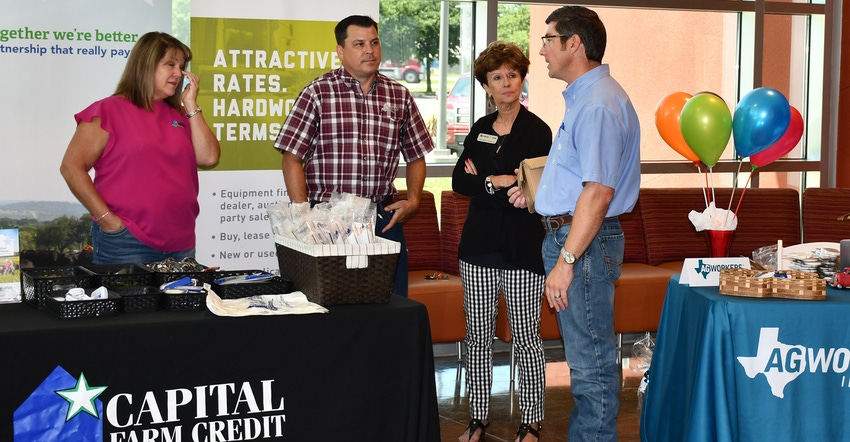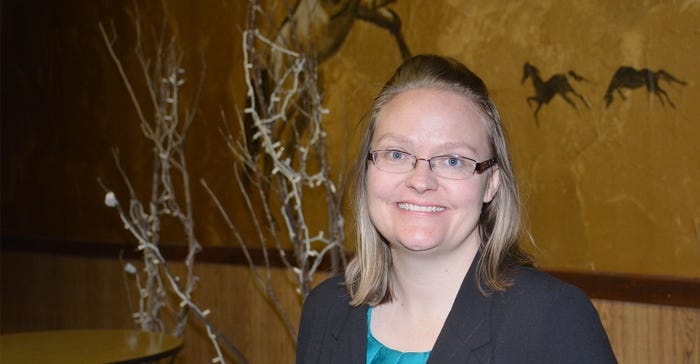June 12, 2019

What is my liability if someone is injured while hunting on my property? How can I get a special tax use valuation for my property? Are my legal responsibilities different if I have cattle in a “closed range” county?
These and many other questions were addressed at the recent “Owning Your Piece of Texas: Top Laws Texas Landowners Need to Know,” program in San Antonio, attended by more than 200 landowners from throughout southern Texas.
See, Lashmet publishes handbook about Texas landowner laws
The free program was coordinated by the Texas A&M AgriLife Extension Service offices in Atascosa, Bexar, Guadalupe and Wilson counties in collaboration with the U.S. Department of Agriculture, AgWorkers Insurance, Capital Farm Credit and the Southern Extension Risk Management Education organization in the Performing Arts auditorium of Palo Alto College.
Dr. Tiffany Dowell Lashmet, AgriLife Extension agricultural law specialist based in Amarillo, was the main presenter. Other presenters were Jim Spivey of Spivey Valenciano PLLC and Dr. Blake Bennett, AgriLife Extension economist, Dallas.

The program also included AgriLife Extension agents Bryan Davis, Dale Rankin, Jeff Hanselka, Sam Womble and Travis Franke, who were available to answer any additional questions related to land ownership or management in their respective counties.
“This was a great opportunity for landowners from different areas to come together and get a lot of helpful information and good guidance from experienced legal experts at no cost,” said Hanselka, agriculture and natural resources agent, Guadalupe County. “It’s rare for many of these attendees to have access to such a comprehensive program on agricultural law presented by such excellent speakers.”
UNAWARE
Lashmet spoke to the audience on a variety of topics ranging from property ownership and access to leasing and liability issues and fence and water law.
“Many people involved in farming, ranching and agriculture are unaware of the type and number of legal issues that can arise from land ownership,” she said. “Often people are excited about starting an agricultural operation but overlook the potential legal ramifications, especially if they’re inviting other people onto their property for something like hunting, or possibly agricultural or nature tourism.
Lashmet said the goal of the program is to help educate landowners on what legal issues might come up and learn about some of the steps they can take to protect themselves.
EMINENT DOMAIN
Spivey shared his courtroom experiences in cases related to eminent domain, a process by which a government entity can claim private land for public use.
“Eminent domain has always been a serious issue for landowners in Texas and will likely be even more of an issue in the future,” he said. “It’s important for landowners to know under what circumstances their land can be taken and how to ensure they receive adequate compensation for that land.”
He said rural landowners are the people most impacted by eminent domain issues related to land being taken for uses such as roads, transmission lines, oil and gas pipelines and public projects.
REAL ESTATE AGENTS
Bennett spoke about property taxes and special tax-use valuation. He addressed agricultural-use valuation, open-space valuation and wildlife management-use valuation and their requirements.
Bennett said his primary efforts through AgriLife Extension relating to these topics has been to get real estate agents more interested and involved in their rural property buyers’ goals for the property they plan to purchase. To date, he has presented 48 programs to more than 1,600 real estate agents statewide.
“I’m focusing mainly on real estate agents getting to know more about the aspirations of those clients who want to be small-acreage producers but only have a vague notion of ‘10 acres and a dream’ to guide them,” Bennett said.“We’re trying to get real estate agents to work with clients in the planning stages — before they even begin a property search.”
Bennett said if real estate agents get a better idea of what their clients have in mind as a long-term goal for their property at the outset, they can help the clients find the land they really want — and possibly point them toward a special-use valuation or some other economically advantageous opportunity.
HUNTING LEASE LIABILITY
Richard Dawson of Falfurrias, who owns about 2,600 acres, some of which he leases out for hunting, was among the attendees.
“I came to the program because I was interested in knowing more about what my liability issues may be, even though I have a third party who handles the hunting-lease portion of my operation,” he said. “We also use about 100 acres of the land for cattle, so I was interested in learning more about my legal responsibilities and potential liability in the event any cattle get out and damage someone else’s property.”
Another attendee, Barry Hevner, who owns about 35 acres in southeast Bexar County, said he came to the program to learn more about open range and fencing issues.
“The speakers were really informative, and I already got some good advice on how I can help limit my personal liability by putting some properly worded signage on the gate leading to my property,” he said.
Hevner also said he was interested in knowing more about eminent domain.
“With all the new people coming into Bexar County and all the new growth and development, I thought it was a good idea to get more information on this topic and how it might affect me and other landowners.”
Another attendee interested in eminent domain issues was Martha Freeman from San Saba County.
“It is important that people understand eminent domain and what they are entitled to for their property,” she said. “My husband Joe and I came to the program to learn about that and also understand water law since there’s water on the property and we’d like to know our rights and any if there are limitations on water use.”
OWNING YOUR PIECE OF TEXAS
According to Lashmet, this was only the second time she has presented the Owning Your Piece of Texas program, although she has presented at numerous agricultural law-related programs throughout Texas for AgriLife Extension.
“The Owning Your Piece of Texas program was just unveiled this year,” she said. “We recently did one in Lubbock that had about 40 people, then took the program to San Antonio. We’ll be headed next to Crockett on June 28, Cat Spring on Aug. 26 and College Station on Sept.12.”
Program attendees also receive the 131-page “Owning your piece of Texas: Key laws Texas landowners need to know,” handbook written by Lashmet.
Source: is AgriLife TODAY, which is solely responsible for the information provided and is wholly owned by the source. Informa Business Media and all its subsidiaries are not responsible for any of the content contained in this information asset.
About the Author(s)
You May Also Like




